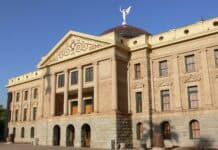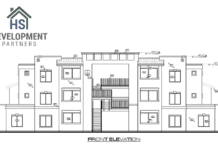
For some, like Jesse Clutterbuck, van life or homelessness is a pragmatic response to economic and physical challenges. For others, like Zack Martin, it’s part of a deliberate process of ethical and intellectual development.
“I think a lot of people have the mentality that they want to get out of the matrix, get out of the system,” Martin said. “Some people become homeless or gypsy like, kind of ties them to the hippie culture. On top of that, I was seeking, looking to understand myself, God, and I figured the system doesn’t teach you that kind of stuff, so I started renouncing — not being attached to money or appearances and vanity.”
Originally from Ohio, Martin first arrived in Sedona in 2017.
“While I was traveling the country, living out of my car, asking people for gas and money, exploring the country — I kind of grew up poor, so it’s not like we went on family vacations all the time — I’m like, I’m going to go explore the country, see God’s green earth and understand myself and God a little bit better. In that, I stumbled upon Sedona,” Martin said. “A lot of the philosophies I was interested in were almost like meditation: You’re not really doing anything on the outside, but you’re moving a world and exploring yourself on the inside. I figured, what better place to be still than Sedona? And be homeless, cause the weather’s perfect. I’ve been here for eight years now.”
“I kind of knew that I would be back here and then I could do more of my stillness, inward traveling,” Martin added. “My mind wasn’t attached to, oh, I gotta be at work on time, I gotta make this money so I can give it to this guy, paying bills. My attention and my energy could be turned inward … There’s a lot of people, new earth people, that want to be revolutionary in the way we live and think and act and treat each other. What’s valuable, and that’s not just money. Trades and goods.”
“I was living off this mentality, I called it the garden mentality, like we’re still in Eden: Everything is here, you just need to reach out and grab it,” Martin elaborated. “In 2017, I wrote a poem that’s almost as simple as like a Dr. Seuss book. It’s called ‘A Trust Poem.’ It was turned into a children’s book and it’s in some of the stores here. The second page in the book is getting away from the idea of wanting or needing anything. You see the character, he’s covering his head in distress, and up above his head, you see these hands reaching out of his head trying to grab a dollar or an airplane, stressing over travel and food.”
For that reason, Martin said, he has largely avoided panhandling in Sedona: “I didn’t want to feel like I was in need of something.”
“I was pretty active as a home less guy,” Martin said of his efforts to engage with the community and participate in events and activities. “It was only my human right and duty to share these ideas to help people feel more liberated in their own life. Once I came to Christ, I started doing that for Jesus.” He credited Wayside Chapel in particular with assisting his moral development.
“A lot of the things that would propel a lot of people is their own pain and suffering to want to figure out a solution,” Martin said. “A lot of that suffering can come from heartbreaks. I was also unconsciously making my relationships my god. Being more devoted to a relationship than I am to God … that last relationship I was in it broke my heart, and I didn’t know where else to go spiritually.”
What assistance does Martin think the city and nonprofits should be offering to homeless individuals?
“Going to spiritual events and having the community, those were nice,” Martin said. “A homeless shelter doesn’t make any sense to me. The car camping thing kind of sounded cool, but somebody needs to be there, like a job … I know people that live in their cars and go work every day, and they need a place to park their car at night, not drive off-road to sleep. People like that, who are working in establishments, they need help.”
He also talked about a friend, Jesse Russo, who formerly took donations of extra items from Sedona’s grocery stores and thrift stores and passed them on to homeless individuals in need on a private basis.
“She took her own time and energy like a saint that distributed all of these things,” Martin said. “She created this hub out of a garage space and called it the Castle. When it was time to open the door, sometimes she’d have 30 people in line waiting to eat. Food that would have been thrown in the trash. On top of all of that, she volunteered at the food bank … This was just one woman who had a garage space who did this. If that could be reinvented, it might encourage more homeless people to be here, be comfortable. I don’t know if I would have felt welcome if it weren’t for something like the Castle.”
“I think the homeless people here are comfortable enough, honestly,” Martin added. “They live in a vacation town. There’s places to eat. The weather is probably the best weather in the rest of the country. All they have to do is worry about not getting arrested for sleeping on the land.”
In his own experience, “I think I got woken up three or four different times by the police, and I never got in trouble.”
Ironically, or appropriately, depending on the observer’s interpretation, it was homelessness that indirectly led to Martin settling down again.
“I took a trip to New Mexico and that’s where — at the time I didn’t know — I was meeting my wife, but I was inviting her to Sedona, and then once she got to Sedona, I invited her to church,” Martin explained. “She was living out of her van, too. She’s the same age I am and left home at the same age, seeking something more than the world and reality could offer … We got married last September and our daughter will be 3 in June.
“Her dad just recently bought us a house and we just moved into our own house after renting for the past two and a half years,” Martin continued. “Because my daughter came, we stopped living out of our vans and I started putting myself out there, kind of made a business. I didn’t know what it was going to be at first, but I figured I could help people fix things. It’s majority landscaping, is what it really is. So that’s where we are now.”
Martin admitted that a sedentary lifestyle offers additional challenges to spiritual development, given the comfort it provides, but noted that he finds going to church helps with that situation.
“Would I trade my home to be back on the streets? No way, but if God told me to, I would, and I know I can, because God was with me that whole time,” Martin said. “It’s easy to be non-attached when you don’t have anything, but put something in somebody’s hand and they look just as human as the next one.”





















